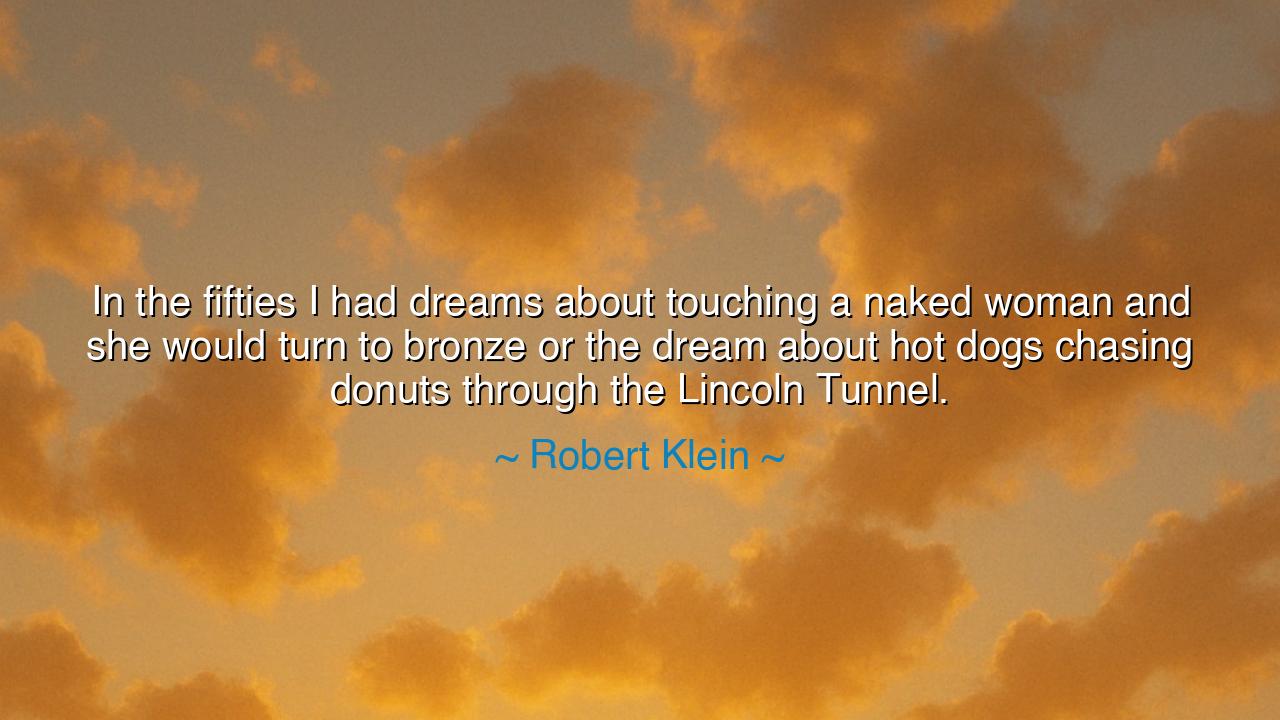
In the fifties I had dreams about touching a naked woman and she
In the fifties I had dreams about touching a naked woman and she would turn to bronze or the dream about hot dogs chasing donuts through the Lincoln Tunnel.






It is said that the dreams of a man often reveal what the waking mind dares not confess. When Robert Klein, the humorist and philosopher of laughter, spoke these strange and vivid words—“In the fifties I had dreams about touching a naked woman and she would turn to bronze, or the dream about hot dogs chasing donuts through the Lincoln Tunnel”—he did not merely jest. Beneath the cloak of absurdity, he touched upon the secret language of the subconscious, where desire and fear dance together in mystery. His words, though whimsical on the surface, echo with ancient truth: that man’s inner world is a theatre where the sacred, the sensual, and the surreal intertwine.
The dream of the bronze woman speaks to the timeless struggle between longing and restraint. To touch beauty, and see it turn to stone, is to encounter the fear that passion will destroy the purity it seeks. In ancient myth, Pygmalion sculpted a woman so lovely that he fell in love with her; but Klein’s vision reverses the tale. Here, the dreamer reaches for warmth and finds only cold metal—a symbol of desire punished by transformation. The bronze woman is the emblem of forbidden intimacy, of yearning that hardens into guilt, of art that desires life but must remain still. It is the eternal paradox of the human heart: to want, and yet to fear the fulfillment of wanting.
Then comes the other vision—the hot dogs chasing donuts through the Lincoln Tunnel, a dream so comic it borders on the divine absurd. This image, wild and nonsensical, mirrors the chaos of American life in the mid-twentieth century—an age of plenty, of repression wrapped in indulgence, of hunger that could not be satisfied. The dream, in its jest, mocks the material and sexual confusions of the era: the chase of appetite through the tunnels of modernity. What better symbol for a nation caught between innocence and excess than food turned to desire, and desire turned to comedy? In this way, Klein’s absurdity becomes revelation. Laughter, he teaches, is a mirror polished by madness.
The ancients would have understood such a vision well. For in every dream, there lies a hidden wisdom. Artemidorus, the old Greek interpreter of dreams, wrote that “the dream does not lie, but it speaks in riddles.” Klein’s dream, too, speaks in riddles. It tells us that the human soul—especially in youth—is haunted by the twin specters of desire and consequence. The bronze woman reveals the fear of freezing the very life one loves; the chasing hot dogs and fleeing donuts show the mind’s frantic attempt to make sense of its hungers. Beneath the humor lies a truth the wise have always known: man’s laughter is often born of pain misunderstood.
There is, too, a tenderness in Klein’s confession. His words are not boastful; they are childlike, filled with wonder and confusion. He does not claim mastery over his dreams, only remembrance. And in that remembrance, there is humility—the recognition that even the strangest thoughts of the night are part of what makes us human. For the soul, when it dreams, paints with the colors of the unconscious. It reveals what the waking tongue conceals. It shows us that beneath the mask of reason lives a creature of chaos, comedy, and yearning. To deny that creature is to deny a part of our own truth.
We see this same truth in Salvador Dalí, whose surreal visions—melting clocks, faceless lovers, impossible landscapes—were not madness, but the translation of dreams into art. Like Klein, Dalí understood that the absurd can carry wisdom, that laughter and fear spring from the same root. His paintings made visible the inner storms that sleep within us all. And so too, Klein, with humor as his brush, painted the dreams of a generation: the dreams of repression and awakening, of confusion and curiosity, of youth wrestling with the bewildering beauty of existence.
Thus, let this strange saying of Robert Klein be remembered not as a jest alone, but as a parable of the inner life. Dreams, no matter how foolish they seem, are the soul’s attempt to speak. Do not laugh at them and forget; rather, laugh and then listen. Within the absurd may lie your own reflection. Within the laughter, a warning. And within the chaos, a calling—to understand yourself, to reconcile your desires with your conscience, to embrace the wildness within you with gentleness and awe.
For the wise know that even the most ridiculous dream is a seed of truth wrapped in madness. The bronze woman and the chasing food are not the inventions of nonsense—they are mirrors of our nature: fearful, hungry, alive. So dream boldly, interpret humbly, and remember always that the imagination is not madness—it is revelation in disguise.






AAdministratorAdministrator
Welcome, honored guests. Please leave a comment, we will respond soon